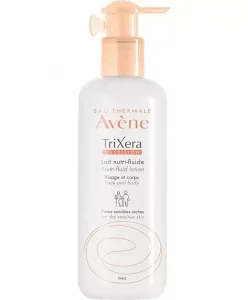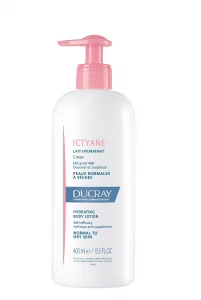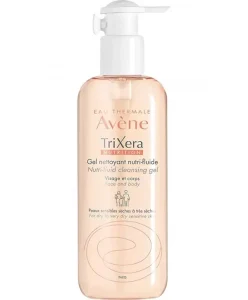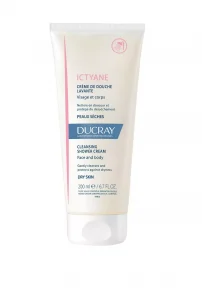
No skin care routine is complete without a body lotion for dry skin, as the goal is always soft, smooth, and hydrated skin. Moisturizers are essential for both rehydrating the skin and preventing future moisture loss, but we often neglect the rest of our body when it comes to our skin care routines. The result? Dry, thirsty skin that needs serious hydration.
After all, dry skin isn’t just a cosmetic issue; it can also lead to itchy, painful cracks and rough patches. But fear not, with the right products, it’s entirely possible to achieve baby-soft skin. That’s why we reached out to dermatologist Dr. Irena Ivanovska to share with you the best body lotions to combat and prevent dry skin.
What are the signs and symptoms of dry skin on the body?
Dry skin can occur all over the body, although the most common areas affected are the hands, face, elbows, legs, feet, scalp, and arms.
When the skin on the body becomes very dry, it can feel extremely tight, scaly, or leathery and is often irritated or even painful. In the case of extremely dry skin, the affected areas may be rough, cracked, and painful. However, it is not always clear that dryness is the cause of these skin symptoms, as it depends on the severity of the condition and the area of the body affected.
- Mild dry skin
At first, you may only notice a slight tightness or roughness in your skin. As the skin loses moisture, patches of dry skin become rougher and may have a chapped or scaly appearance. These patches of dry, scaly skin are likely to be itchy and cause mild irritation.
- Severe dry skin
Extremely dry skin on the body occurs when dry patches are not treated properly. The skin can become damaged, extremely tight, rough, and potentially cracked and bleeding. Very dry skin is often prone to itching and irritation.
What causes very dry skin on the body?
There are many causes of dry skin on the body. These include external factors and internal factors:
External factors of dry skin on the body
External factors compromise the skin’s natural barrier function, resulting in increased moisture loss through the skin. Several external factors can cause dry skin:
- Environmental causes of dry skin:
- Harsh weather conditions – hot, cold, and dry air can disrupt the skin’s barrier function, leading to moisture loss and dry skin. This is especially common in the winter when cold, dry air, and low humidity can dry out the skin.
- Seasonal changes – symptoms of dry, flaky skin often worsen in the winter and summer, when increased hot or cold air can lead to skin dehydration.
- Ultraviolet rays from the sun: UV rays can accelerate skin aging. As skin becomes more prone to dryness with age, it is more likely to become dry, flaky, chapped, and cracked.
- Chlorine – dry skin can occur after contact with chlorine in a swimming pool.
- Skin care factors that affect skin hydration:
- Washing too often – Frequent washing and long and hot baths can remove the lipids that make up the skin barrier, leading to dry, itchy and red skin.
- Improper skin care routine – it is important to follow a proper skin care routine and use products that are suitable for dry skin. It is recommended to avoid soaps and other skin care products that can remove the skin’s natural lipids.
Internal factors that can cause dry skin
- Genetic influences:
Dr. Irena Ivanovska believes that genetics can affect the risk of having dry skin. She explains that there are certain mutations in genes that can control the production of the protein filaggrin, which plays a role in the formation and hydration of the skin barrier.
- Medications:
Dry skin is a side effect of many medications. Dr. Irena Ivanovska indicates that blood pressure medications, cholesterol medications, acne treatments, anti-wrinkle creams, and antihistamines, can cause dry skin when taken long-term.
- Hormonal influences:
Changes in the levels of certain hormones, particularly estrogen and testosterone, can influence skin moisture and lipid levels. This is particularly noticeable after menopause when skin becomes dry due to a decrease in estrogen production. Dry skin can also occur during pregnancy due to hormonal changes.
- Diet:
Like any other organ, the skin needs a range of important nutrients to function properly. These include unsaturated fatty acids and vitamins. A diet that lacks any of these elements can contribute to dry skin and worsen existing conditions.
- Age:
As the skin ages, the number of sebaceous and sweat glands decreases, reducing the ability to produce sweat and lipids. Likewise, the skin’s water content and ability to retain moisture are also reduced. These factors lead to dryness and loss of elasticity, which in turn contribute to skin aging.
Keep reading to find out which lotion is good for dry skin and ways to get rid of this skin condition.
What is the best body lotion for dry skin?
The best way to combat dry skin is to apply a good body lotion regularly. While you can use a moisturizer at any time of the day, it’s always best to apply it after a shower, when your skin is still a little damp, to lock in moisture. This is especially important after shaving to avoid irritation and to provide a good dose of moisture.
Body lotions are essential for rehydrating skin, making it soft and smooth and strengthening the skin barrier by keeping moisture in and external irritants out.
However, not all are created equal. The best lotion for dry flaky skin offers a strategic combination of ingredients to best moisturize the skin. When it comes to body lotions, it’s important to look for products that contain different types of moisturizing agents. According to Dr. Irena Ivanovska, these include ceramides, glycerin, shea butter and dimethicone.
- Ceramides help hold the skin together by forming a protective layer that limits moisture loss.
- Glycerin, which is a humectant, draws moisture to your skin.
- Shea butter increases skin hydration, softens and moisturizes the skin. It contains several types of fatty acids that improve the skin’s natural barrier.
- Dimethicone works by forming a film that prevents water loss through the skin to help maintain skin moisture.
As such, consider these formulas that will keep your skin soft, smooth and glowing.
Eau Thermale Avène Trixera Nutrition Nutri-Fluid Lotion
Ducray Ictyane Hydrating Body Lotion
As discussed, dry skin is likely due to the breakdown of the skin’s surface barrier. So, the cleanser should be gentle enough not to remove this natural protective barrier. For very dry, rough skin, we recommend using a gentle, regenerating and effective cleanser before moisturizing. It can be used daily and does not remove the skin’s natural protective barrier.
That’s why we recommend the following cleansers that deeply cleanse, nourish and hydrate your skin.
Eau Thermale Avène TriXéra Nutrition Nutri-Fluid Cleansing Gel
Ducray Ictyane Cleansing Shower Cream
What are some ways to banish dry skin?
For effective dry skin treatment, it is essential to avoid the factors that can make it worse. Dr. Irena Ivanovska recommends the following:
- Limit your daily bath to 5-10 minutes. If you bathe longer, you risk removing much of the skin’s oily layer. Use medium-temperature water rather than hot water, which can remove natural oils.
- Minimize the use of soaps, soap-free cleansers are better!
- Avoid bath sponges, scrub brushes and washcloths.
- Apply moisturizers immediately after bathing or washing hands.
- Use fragrance-free laundry detergents and avoid fabric softeners.
- Avoid wearing wool and other fabrics that can irritate the skin.













